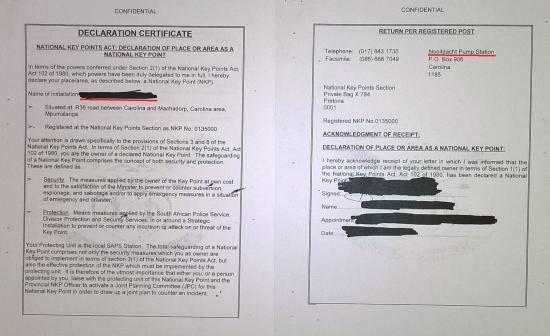Each registration and declaration certificate is accompanied by an Acknowledgement of Receipt from the legally defined owner of the site, and the South African Police Service has redacted the names of the owners and dates of signature. In its decision on this request the SAPS stated that the locations of the NKPs and 'personal details' of the legal owners have been redacted as the SAPS would have to issue third party notices to every legal owner under section 47 of PAIA, an activity which it argues under section 45(b) of PAIA would be a substantial and unreasonable diversion of SAPS resources. In terms of PAIA, a person's name is not as a general rule regarded as personal information unless the context in which it appears reveals more personal information about that individual. The SAPS has not elaborated on how the presence of the NKP owners' names in the records would constitute personal information in this regard.
Interestingly, the Declassification Certificates instruct the owners of a declassified NKPs to inform the NKP Section of the SAPS 'if the circumstances of [the] NKP should change to such a degree that its status as a NKP is affected... so that a re-evaluation can be carried out'. This instruction speaks directly to one of the questions SAHA has tried to answer with this PAIA request: what are the circumstances considered in the evaluation of a site to decide whether or not to classify or declassify it as a NKP? On the one hand, the SAPS seems to rely upon the owners of declassified NKPs to proactively approach the SAPS when they think that circumstances are such that their site should be re-evaluated as a NKP. On the other hand, the SAPS has adopted a 'shopping list' approach in defence of their position that the criteria for the classification or declassification of NKPs remain secret, citing no less than seven provisions of PAIA (under sections 38 and 44) to this end.
Moreover, the same seven provisions have been cited in the SAPS' blanket denial of access to information regarding decisions to classify or declassify all National Key Points. The SAPS is essentially insisting that revealing any information relating to the criteria used by the Minister to classify or declassify a NKP is likely, under section 38, to 'prejudice or impair-
(i) the security of
(aa) a building, structure or system, including, but not limited to, a computer or communication system;
(bb) a means of transport; or
(cc) any other property; or
(ii) methods, systems, plans or procedures for the protection of ...
(bb) the safety of the public, or any part of the public; or
(cc) the security of property contemplated in subparagraph (i) (aa), (bb) or (cc).'
It seems unlikely that every one of the provisions above could apply to every record regarding a decision to classify or declassify a NKP. It has also been held by the Constitutional Court in President v M&G Media Limited that the mere recitation of claimed grounds for refusal is not sufficient evidence for refusal of access to a record. Sufficient information must be provided to show that the record falls within a specific ground for refusal.
SAPS has cited sections 44(1)(a)(i) and (ii) of PAIA in its refusal to release records on the basis that they 'contain evaluations and related information that was used to assist the Minister to exercise his powers under the National Key Points Act'. Although section 44 of PAIA allows public bodies to refuse access to information that relates to certain internal workings of government, there is ample case law which has determined that section 44 must be interpreted restrictively. For example, draft reports or policies are not protected by section 44 of PAIA where a final report or policy has been adopted or a final decision taken. Hence, in cases where a decision has been taken to declassify a NKP, or that a site does not require protection under the National Key Points Act, records should be made available which relate to the decision process as the process has been concluded. There does not seem to be a compelling reason why access to records regarding the declassification of NKPs should then be withheld under either section 38 or section 44 of PAIA.
Furthermore, access to a record must be granted where it consists of an account or statement of reasons for an administrative act which has an important and negative impact on someone's rights, in accordance with section 5 of the Promotion of Administrative Justice Act. As highlighted in a number of discussions surrounding NKPs, there is a potential limitation of rights inherent in the declaration of a NKP as the National Key Points Act places criminal sanctions on certain activities with respect to NKPs. In addition, SAPS has attempted to enforce sanctions which are not even prescribed by the legislation, for example by attempting to convince people that protesting outside a NKP is an illegal activity. This is yet another argument against SAPS' reliance on section 44 as grounds for refusal of the PAIA request.
By generally citing the provisions of section 38 and section 44 as grounds for refusal with respect to the classification or declassification of all NKPs, SAPS' decision to refuse access to this information is as broad and ambiguous as its decisions to classify and declassify NKPs in the first place. The implication is that the SAPS personnel responsible have not applied their minds to the requests and are unwilling to explain the precise reasoning behind the redactions and denials of access in question.
For further explanation of how different sections of PAIA are interpreted, see our publication PAIA Unpacked.





